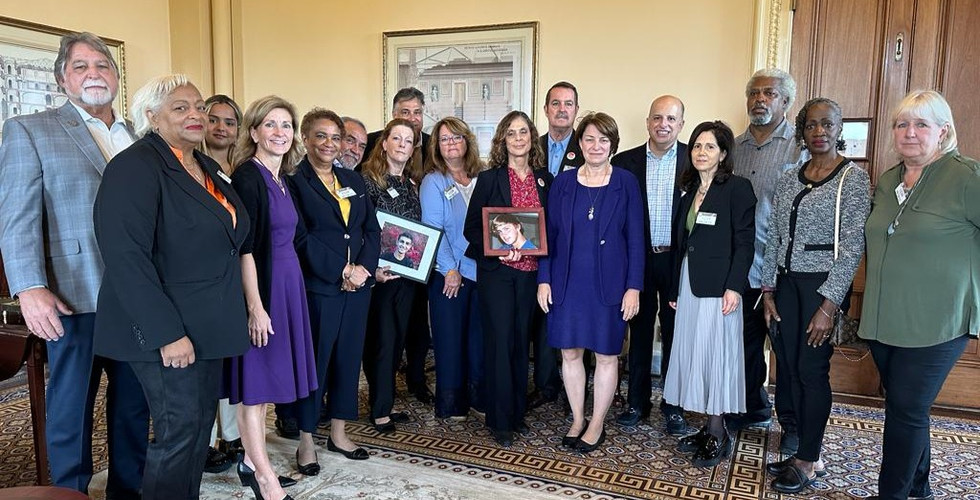October 2023 Newsletter
- Antonio Tsialas Foundation

- Oct 2, 2023
- 4 min read
Updated: Oct 9, 2023
Compassionate Leaders Embrace Accountability

When our son Antonio passed away in 2019, following a “dirty rush” event he attended at Cornell University’s Phi Kappa Psi fraternity, the leaders who had information about what happened fell silent. No one would disclose any aspects of the events that led to Antonio’s death. No one was accountable for their actions and so we endured the worst days of our lives not knowing the details surrounding his untimely passing.
Accountability is one of the pillars of compassionate leadership. To be accountable means taking responsibility for our actions even - or perhaps especially - when the outcome of our choices is negative. Only then can we find solutions to correct our conduct and avoid repetition of damaging mistakes.
Being accountable requires remarkable courage and, as with all leadership skills, it takes practice. Shame and fear of consequences can make it very difficult for us to recognize and accept responsibility for our mistakes. Human nature makes it tempting to lie or keep secrets to avoid accountability. Often when we make mistakes, our instinct is to hide and hope our errors go away.
Yet, accountability is essential to compassionate leadership and to ending hazing.
Antonio’s death was shrouded in silence because of a lack of accountability. Hazing thrives in silence. In fact, according to research from the University of Maine, 55 percent of college students who participate in clubs, teams and organizations experience hazing, yet it is almost never reported. As long as hazing remains hidden and without accountability, it will continue.
For this reason, we must encourage the new generation of compassionate leaders to practice accountability. In addition, each of us must challenge ourselves to be accountable for our actions at home, in schools and organizations.
Thank you for choosing to be a compassionate leader!
ATLF Ambassadors Corner

Compassionate leadership is rooted in a profound sense of accountability. It goes beyond just delivering results; it encompasses a commitment to the well-being and growth of individuals and the organization as a whole. At its core, accountability means taking responsibility for one's actions, decisions, and their consequences.
Accountability in compassionate leadership means acknowledging mistakes, learning from them, and fostering an environment where others can do the same without fear of retribution. It involves transparent communication, setting clear expectations, and holding everyone, including oneself, to high standards.
Moreover, accountable compassionate leaders actively listen, empathize, and offer support when needed. They recognize the unique strengths and challenges of each team member, ensuring that individuals feel valued and empowered.
Michael Bittner Mcpherson
ATLF Ambassador
Support the Stop Campus Hazing Act
We have been in Washington DC together with the Clery Center, Stop Hazing and other courageous families whose children have suffered from the tragedies of hazing. We have been meeting with lawmakers to urge them to support the Stop Campus Hazing Act.
Join The Antonio Tsialas Leadership Foundation, the Clery Center, Stop Hazing and many others to urge legislators to vote YES.
Show your support and contact your local state representative with this simple form at https://stophazing.org/policy/action/ and urge them to support the Stop Campus Hazing Act.
Help honor Antonio and countless others who have suffered from the tragedies of hazing. This Act aims to make our campuses a safer space for many generations to come. Together we can make our campuses safer!
Antonio Tsialas 2023
Hazing Prevention Week at Cornell University
October 2-6, 2023
This week we connected with fraternity and sorority leaders as part of the Antonio Tsialas ’23 Hazing Prevention Week at Cornell University.
It is emotional to be back at Cornell, but speaking with students and administrators who want to be compassionate leaders and are committed to change gives us hope for the future.
It was also great to see student leaders from last year that have been implementing compassionate leadership in their fraternities/sororities and on the Inter Fraternity Council.
Every action contributes to change. Together we can end hazing once and for all. Thank you to Kara Miller and her amazing team for welcoming us again this year and for continuing the passive message by leading with love and compassion.
Hazing by Byron Hurt at Cornell University
On behalf of the Antonio Tsialas '23 Hazing Prevention Week at Cornell University, we had the honor to participate in a Q & A panel discussion following a viewing of the documentary “Hazing”by Byron Hurt.
We joined Marie Andrè, George Desdunes’ mom, and the director himself for a very meaningful and powerful exchange.✊🏾🙏🏽💛💙🤍
It was magnificent to share a few days with these two courageous people, who fill our world with so much love and compassion. 👏🏽👏🏽🙌🏽
During the showing of “Hazing”, we honored both Antonio ‘23 and George Desdunes ‘13 and Byron Hurt skillfully lifted the veil exposing the dark secrets about hazing that have harmed college students for more than a century.
We hope this documentary is viewed by many and helps spark conversations about this very complex issue. 🛑
The young lives of Antonio, George, and too many others were lost to hazing, while others live with the damage from humiliation and injury.
We will continue to share our stories to enlighten and empower young students at Cornell and everywhere. We all encouraged students to use their voice and act for change.💛💙🙏🏽
“IT IS OUR SILENCE THAT IS AN ACT OF BETRAYAL“ Byron Hurt
👏🏽👏🏽👏🏽✊🏾🙏🏽💛💙💓

















Comments